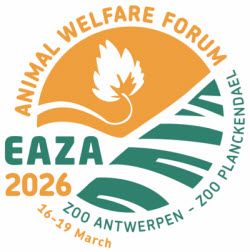EAZA Animal Welfare Forum 2026
16-19 March 2026 (Antwerp Zoo, Belgium)
Welcome to Antwerp!
The EAZA Animal Welfare Forum is a biennial event, which in 2026 will be organized for the third time. The Welfare Forum brings together around 200 representatives of zoos and aquariums, welfare organisations and academic institutions for three days of workshops, presentations and other activities, discussing and highlighting an evidence-based approach to animal welfare and bridging the gap between welfare research and application.
The final programme (V2) is now available!
Early-bird registration has ended, regular registration is still open! REGISTER HERE
Fees (excluding 21% VAT)
| Early-bird rate (Finished) | Regular rate | |
| Full registration | €510 | €640 |
| Single day registration | €180 | €215 |
| Academy fee EAZA Member | €265 | €265 |
| Academy fee non-EAZA Member | €365 | €365 |
| Farewell dinner | €118 | €118 |
| Excursion Planckendael | €20 | €20 |

Accommodation
The following hotels offer a discounted rate for AWF delegates. Discounted rooms are available until they are fully booked. Click here for hotel information and booking (special AWF26 rates apply).
| Hotel | Single use (incl. breakfast) | Double use (incl. breakfast) |
| Hyllit Hotel | €145 | €170 |
| Radisson Blu Hote | €189 | €209 |
| Hampton by Hilton | €115 | €125 |
| The Ash | €85 | €95 |
| NH Collection Antwerp | €144 | €174 |
| B&B hotel Antwerpen Centrum | €99 | €113 |
| Holiday inn Express – City Centre | €109 | €119 |

A Room with a ZOO
The EAZA Animal Welfare Forum 2026 will be held in the conference venue A Room with a ZOO. One of the easiest venues to reach by train A Room with a ZOO is almost the continuation of the adjacent Belle Époque international station linking to the European rail network and establishing the classic style with its cathedral like halls. Hotels being within easy walking distance mean there is plenty of time to explore the somewhat unknown City of Antwerp.
The venue is the only convention centre in the world with a ZOO on site: a ZOO with its own award-winning science and research centre, and managed according to the highest standards of animal welfare of EAZA and WAZA, the international associations of zoos which was co-founded by the Antwerp ZOO.
Scientific research is in the DNA of the ZOO. Science is practiced and applied in the Antwerp ZOO, but also in research stations abroad, in the ZOO’s lab, under our supervision in universities and, above all, in the zoological research centre "the Centre for Research and Conservation" (Antwerp CRC). Since the official start in 2000 this research centre has grown into one of the most advanced zoological research centres worldwide.
The ZOO’s scientists and experts are leaders in their fields, which include genetics, animal behaviour, animal welfare, veterinary medicine and animal morphology. With this expertise we work together in research projects related to three main themes: animal welfare, nature conservation and basic zoology research.
Programme
Final programme is now available!
We are excited to announce our keynote speakers:
- Françoise Wemelsfelder – Qualitative Behaviour Assessment
- Jason Watters – Practical approaches to zoo animal welfare
- Daan Laméris – Assessing cognitive and affective states (Fifth Domain)

Daan Laméris
Daan Laméris is a behavioral biologist whose work bridges primatology, comparative psychology, and applied animal welfare research. Based at Indiana University Bloomington and the Antwerp Zoo Centre for Research and Conservation, he investigates how affective states interact with cognition, social behavior, and welfare in great apes. His research integrates observational methods with non-invasive experimental techniques, including touchscreen and eye-tracking technology, to better understand how animals perceive their world and how this can inform welfare practices.
Daan’s work demonstrates that affective states structure how animals process information. He has shown how emotional signals from group members bias attention and memory, how husbandry-related social events induce internal states that shift cognitive processing, and how both mechanisms can inform welfare practices. A central challenge in his recent work is understanding positive emotions: identifying practical indicators, developing methods to measure them reliably, and using approaches such as laughter playbacks to study their cognitive correlates.
Through interdisciplinary, welfare-focused science, Daan aims to enhance our understanding of great ape emotional lives and support evidence-based improvements in management and care.

Françoise Wemelsfelder
Françoise Wemelsfelder is a biologist and Professor in animal behaviour and welfare at Scotland’s Rural College (SRUC) in Edinburgh. Her main research interest is the study of animals as whole sentient beings, bringing insights from philosophy of mind and social anthropology into the scientific assessment of animal emotion and well-being. This interest led her to develop, in collaboration with SRUC colleagues and research teams around the world, a methodology called ‘Qualitative Behaviour Assessment’ (QBA), which enables observers to describe and quantify emotionally expressive qualities that emerge from the way animals engage with their environment (e.g. relaxed, curious, fearful, distressed).
Françoise works with colleagues in different fields and industries to apply QBA in research and as a practical tool for welfare management in farm, zoo, and companion animals. Her experience of cross-disciplinary thought was much enriched by a sabbatical year (2011) in the department of social anthropology at the University of Aberdeen. In recent years she has focused on the development and field-trialling of a QBA mobile application for data collection and analysis with various industry partners.

Jason Watters
Jason Watters, Ph.D. has published dozens of research articles and book chapters ranging in topics from animal personality, conservation, animal welfare – all from an animal behaviorist’s perspective.
In the international zoo community Dr. Watters is considered one of the leading scientific voices in zoo animal welfare and is regularly invited to present ideas and findings on animal welfare issues. He is Executive Editor Emeritus of the journal Zoo Biology.
Dr. Watters has has built research programs at two major zoos and helped numerous students develop. He has been on the faculty of University of Chicago, University of California at Davis, and San Francisco State University. In addition, he has been a lecturer at Stanford and a visiting scholar at Nottingham Trent University in England. His peers recognize him as one who develops, and tests, theory aimed at exposing generalities in animal behaviors.
Dr. Watters has served on the Association of Zoos and Aquariums Research and Technology Committee, has been an Executive Vice President at a major US zoo, overseeing several departments, has co-authored the World Association of Zoos and Aquariums Animal Welfare Strategy, and served on the team that drafted the Association of Zoos and Aquariums Strategic Framework for the Wellbeing of Animals. He currently serves on the Smithsonian-Mason School for Conservation’s advisory board.

(Fully Booked!) EAZA Academy workshop: Quality of Life Assessment (QoL)
Monday 16 March (08:30 - 17:00)
There has been a significant shift in the perception of animal welfare in captive animals over the past three decades, with the Five Domains model being a critical turning point in establishing the fundamental requirements needed to ensure that welfare needs are met. There is however, the necessity to conduct more in-depth assessment of the welfare of specific individuals for which there is an ongoing concern about their health or behaviour.
In response, a Quality of Life Assessment (QoL) was produced by BIAZA in 2022 to help members objectively analyse and track the welfare of individual animals. The process involves data gathering of historical information from ZIMS for medical and behavioural studies, along with live behavioural and enclosure use observations to monitor 24-hour activity of the focal animal. All information is then reviewed during a roundtable discussion where the QoL template is completed and mitigating actions defined.
This workshop will include hands-on data collection from a range of sources such as videos and husbandry notes, and participants will be involved in completing a QoL assessment. It aims to help staff fully understand the QoL process and how it can influence positive welfare changes across a variety of species.
Tutors:
- Dr. Holly Farmer
- Dr. Sarah Richdon
- Lisa Clifforde
Learn more about the course here.

